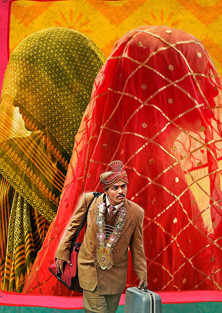Laapataa Ladies Movie Review
Deepak (Sparsh Shrivastava) and Phool (Nitanshi Goel) are newly married. The couple boards a crowded train to Deepak’s village Mukhi. It being the wedding season, their compartment has other married couples as well. The women are clad similar attires and have a heavy red veil over their faces, limiting their vision. When their halt comes in the night, Deepak mistakes another bride for Phool and asks the girl to alight with him. After returning home, Deepak realises that the woman he has taken home is not his wife Phool but actually a girl who introduces herself as Pushpa Rani (Pratibha Ranta). Phool gets off at another remote station and finds herself lost. She's helped by a midget, Chotu (Satendra Soni) and Manju Maayi (Chhaya Kadam), an elderly woman running the tea stall. Pushpa is kind of adopted by Deepak’s family and well looked after, with the whole family involved in getting her back to her real husband. But she's not what she seems. Meanwhile, a corrupt but benign police inspector Manohar (Ravi Kishan) starts taking interest in the case and draws some startling conclusions…
As said earlier, the film is a social satire which talks about women empowerment. Being with Manju Maayi helps Pooja learn self-reliance. Maayi tells her that she should learn to stand up for herself and starts living for herself and not just for others. The elder woman opens her eyes to the fact that patriarchy is ingrained thoroughly in our society and one should recognise that and fight that in order to live on one's own terms. Pushpa too has her own struggles. She's a brilliant student, who wants to study further and is stymied by circumstances from doing so. When fate gives her a chance to right the wrongs, she grabs the opportunity by its forelocks and takes full advantage of the situation.
Small incidents drive home big points in the film. The women of Deepak's house discuss that they’ve forgotten what their favourite dishes are as they’ve always catered to the choices of the men in the family. Deepak’s father asks him to wear old clothes while going to the police station as the amount of bribe rises in direct proportion to how well-off one looks. Another incident points towards the fact that keeping women veiled robs them of their identity. Chhaya Kadam’s character once says that women don’t actually need men for anything and men have always suppressed that fact. She also emphasises that companionship is one thing but learning to live alone is rewarding as well. The romance between Deepak and Pooja is as real as it gets, devoid of any filmic connotations. Her growth as a woman who recognises her strengths is organic.
The film’s casting is a masterstroke. Apart from Ravi Kishan’s obvious star value, who has done a wonderful job as a bribe-hungry cop, who nevertheless knows right from wrong, the main players are newcomers. Sparsh Shrivastava, Pratibha Ranta and Nitanshi Goel are perfect in their respective roles. One feels one’s watching someone taken from the street and not professional actors. Their expressions, diction, and body language is spot on and all three have done ample justice to the characters they portray.
Kiran Rao, whose last film as a director, Dhobi Ghat, came in 2010, has made a film which entertains you at all fronts. Why such a competent director waited for such a long time for her next offering is beyond our ken. Let’s hope she picks up the gauntlet soon.
Watch Laapataa Ladies for its moving story, powerful message and the realistic acting displayed by the entire cast.
Trailer : Laapataa Ladies
Renuka Vyavahare, February 28, 2024, 6:30 AM IST
Story: Trouble ensues when two young brides Phool Kumari (Nitanshi Goel) and Pushpa (Pratibha Ratna) get accidentally swapped during a train journey. Phool’s hapless husband Deepak Kumar (Sparsh Shrivastav) seeks help from a corrupt cop Shyam Manohar (Ravi Kishan), adding to the chaos.
Review: Kiran Rao’s directorial debut ‘Dhobi Ghat’ was a haunting, almost voyeuristic portrait of shattered hope, and dreams in Mumbai. Set in rural India, Laapataa Ladies, a sharp satire, is her return to direction after 14 years and the dramedy stuns you with its clever social commentary and heartfelt sisterhood.
Laced with delightful moments, the messaging isn't overbearing. It never overshadows the entertainment quotient as Rao masterfully uses humour and veiled identity (ghunghat) to reflect upon deep-seated patriarchy and its repercussions. Her light-hearted, slice-of-life storytelling makes a solid case for women empowerment, education, and equality without disparaging men or succumbing to prejudice. “Dowry nahi liya toh ladke mein khot hogi”, comments a female character mocking a liberal man.
Family friendly and acutely observed, Biplab Goswami and Sneha Desai’s story and script provide food for thought. Every character is flawed but likeable, especially the corrupt but conscientious Shyam Manohar. Ravi Kishan is outstanding in his portrayal of a man, who is both greedy and just. The lead new faces do a commendable job, too.
The film’s most memorable scene sums up the movie’s intent perfectly. Hardened by life, a middle-aged tea stall owner Manju (an impeccable Chhaya Kadam who sort of replays her Sairat character) chooses to live alone instead of tolerating disrespect and domestic violence. She tells Phool, “If those who love you have a right to hit you, I exercised my right, too. (mic drop! No Animal was harmed in the making of this one liner).”
A girl is never smart, she is over smart. A woman is not clever, she is cunning. Laapataa Ladies tramples these age-old narratives by stating loud and clear, “A ‘respectable’ girl is the biggest fraud in society’, as it conditions her to not question the status quo. The story doesn’t allow women to play the victim card either. It sternly says, “It’s not shameful to be a fool but being proud of one’s ignorance is a shame.”
A delectable blend of heart, mind, and humour, this one’s an absolute winner.

